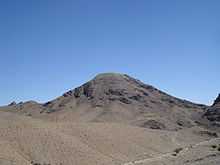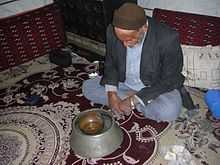Zibad
| Zibad زيبد | |
|---|---|
| village | |
 | |
 Zibad | |
| Coordinates: 34°16′35″N 58°29′15″E / 34.27639°N 58.48750°ECoordinates: 34°16′35″N 58°29′15″E / 34.27639°N 58.48750°E | |
| Country |
|
| Province | Razavi Khorasan |
| County | Gonabad |
| Bakhsh | Kakhk |
| Rural District | Zibad |
| Population (2006) | |
| • Total | 868 |
| Time zone | IRST (UTC+3:30) |
| • Summer (DST) | IRDT (UTC+4:30) |
Zibad (Persian: زيبد, also Romanized as Zībad)[1] is a village in Zibad Rural District, Kakhk District, Gonabad County, Razavi Khorasan Province, Iran. At the 2006 census, its population was 868, in 288 families.[2]

Zibad, meaning beautiful, was a famous ancient city in Shahnameh. According to Shahnameh Ferdowsi (around 1000 AD), it was the place of a famous war called 12 rokh (12 hero) between Iran and Turan. Zibad also has an ancient qanat that may be more than 1600 years old.

Zibad is famous for :
- its saffron production.and opium in the last centuries.
- its ancient castle which was shelter of the last emperor of Persia, Yazdegerd III, the place of 3 ancient war, and its Mithraism monument.
- its Qanat and darb e soufe a famous mountain wall rock, similar to Taq-e Bostan
- its water clock which had been in used continuously since 400BCE until 1950.
- its water mill.Watermill producing flour and Crushed wheat. the ancient water mill was at work until 1984 and destroyed for construction of a dam


According to Callisthenes, the Persians were using water clocks in 328 BCR to ensure a just and exact distribution of water from qanats to their shareholders for agricultural irrigation. The use of water clocks in Iran, especially in Zibad, dates back to 500BCE. Later they were also used to determine the exact holy days of pre-Islamic religions, such as the Nowruz, Chelah, or Yaldā - the shortest, longest, and equal-length days and nights of the years. The water clocks used in Iran were one of the most practical ancient tools for timing the yearly calendar. .[3]
| Wikimedia Commons has media related to Zibad. |
References
- ↑ Zibad can be found at GEOnet Names Server, at this link, by opening the Advanced Search box, entering "-3089466" in the "Unique Feature Id" form, and clicking on "Search Database".
- ↑ "Census of the Islamic Republic of Iran, 1385 (2006)" (Excel). Islamic Republic of Iran. Archived from the original on 2011-11-11.
- ↑ conference of Qanat in Iran - water clock in persiaد1383 آفتاب
| |||||||||||||||||||||||||||||||||